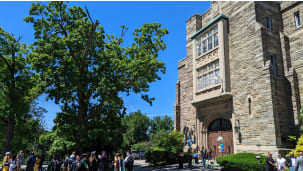Majoring in Marijuana: Best Colleges for Studying Cannabis

The growing marijuana legalization in the US represents a strong professional opportunity for the prepared student. If you want the direct route, these colleges and universities offer courses, certifications, minors, and even bachelor’s degrees in cannabis studies. Here are the top schools for studying marijuana, the top cannabis influencers and the most influential books about cannabis.
Key Takeaways
- Opportunities for a cannabis degree have grown in the past twenty years, thanks to the legalization and acceptance of the cannabis industry in the United States. Cannabis education is available in various degrees, from bachelor’s to graduate degrees. There are also certificates and courses available.
- Some cannabis degrees and courses are offered online, while others are taught in a classroom. They cover topics like cannabis farming, cannabis law, and the cannabis business.
- While some jobs in the sector require specialized cannabis courses and degrees, some don’t. Examples of jobs that do not need a degree include budtenders and trimmers.
The cannabis industry is in a state of steady growth. For students already with a background in subjects like business, law, chemistry, and plant biology, this growth represents great professional opportunity. And for students interested in taking a more direct route, a number of fully accredited colleges and universities now offer courses, certifications, minors, and even four-year bachelor’s degrees in cannabis studies. We’ve highlighted the top schools for studying marijuana - and as a bonus, we’ve included a ranking of the Top Cannabis Influencers and the Most Influential Books About Cannabis from the last half-century.
A few years ago, legalizing marijuana would have probably made our list of The 25 Most Controversial Topics. But times have changed. As of April 20th, 2021, medical marijuana is legal in 36 states. Of these, 16 states (and Washington D.C.) have legalized recreational marijuana. And according to a Pew Research poll from 2019, 91% of American adults believe that marijuana should be legal in some form, whether just for medical use (32%) or for both medicinal and recreational use (59%).
In other words, marijuana isn’t a controversy — it’s an opportunity. The cannabis business is booming, bringing in more than $13.6 billion in legal revenue for the U.S. in 2019, and generating more than 340,000 jobs. This may only scratch the surface of its economic potential. At the time of writing, marijuana remains a Schedule I illegal drug according to federal law. Economic and legal trends suggest it may only be a matter of time before marijuana prohibition is lifted throughout the United States.
Growing operations, legal dispensaries, cannabis supply chains, and practitioners of various therapeutic treatments are either in the midst, or on the verge, of realizing tremendous commercial potential. But realizing this potential demands real-world skills. So what does that mean for students who aspire to be a part of the green rush?
If you really want to be a part of the marijuana business, you’ll need an education. From cultivation to distribution, from business management to marketing — there’s a lot that goes into a multibillion dollar cash crop industry. If you’re curious how you can be a part of cannabis commerce, start by checking out colleges offering courses in cannabis, majors in marijuana, and degrees in dankness. Ok, that last one isn’t a real thing. But the point remains — what follows is a look at the best pathways to getting an education in marijuana and advancing a career in cannabis. And keep reading for our bonus lists featuring The Top Cannabis Influencers and The Most Influential Books on the Topic of Cannabis.
More About the Cannabis Degree Program
Years ago, obtaining formal education related to the marijuana industry was impossible. But today, thanks to acceptance and legalization, many colleges and universities are doing the unthinkable: offering cannabis degree programs and courses to anyone wanting to enter the cannabis sector.
There’s even an organization that helps students and workers in cannabis businesses, the National Cannabis Industry Association (NCIA).
Even the most seasoned academic nerd may find it challenging to decide which cannabis education to pursue. Even if it may be slightly more expensive and time-consuming than you had anticipated, it is preferable to sit down and research which forms of cannabis education are worthwhile.
What To Expect with a Cannabis or Marijuana Degree
What You’ll learn
University degrees in cannabis offer a more thorough examination of the drug. Medical cannabis science degree programs provide opportunities to learn about subjects outside of cannabis and focus on specific cannabis-related issues, resulting in holistic and comprehensive cannabis education.
Cost
Cannabis degrees from universities are always more expensive than cannabis training school diplomas. University degrees generally take place in a classroom setting and cover a significantly wider range of subjects over several units.
In addition, you must pay tuition. The proven way to reduce your expenses is to enroll in a part-time online cannabis degree program, but these aren’t always available and will primarily include on-campus classes.
Duration
Less time is required for cannabis certification programs at training schools than for cannabis degrees at universities. Depending on the cannabis training institution you choose, it can take anywhere from six days to six months to get a cannabis certification. Comparatively, a bachelor’s degree takes four years to complete, while an associate’s or master’s degree takes two.
Legitimacy
When considering obtaining a cannabis degree, it’s best to get it from reputable universities. Cannabis training schools or boot camps may not offer a scientific approach to cannabis and, frequently, are considered not authentic.
Top Medical Marijuana Career Opportunities
Budtender
Budtender, or marijuana salesperson, is one of the top career opportunities, especially for those who don’t have a formal education in the subject. As a medical marijuana salesperson, you’ll be assisting patients in selecting the best cannabis strains and products.
Bud Trimmer
It’s time to harvest mature cannabis plants once the growing season is done. Hand-cutting the cannabis bud from the plant is the job of bud trimmers. This entails cutting the buds swiftly and precisely following the brand’s specifications after eliminating the larger fan leaves.
Dispensary Manager
To assist medical patients in finding their medication, a medical marijuana dispensary manager must establish a skilled team of budtenders. Managers must emphasize staff training to ensure compliance with federal, state, and local laws.
Extraction Technician
With cutting-edge machinery, extraction specialists separate the cannabis resin from the raw cannabis material in a lab setting.
Master Grower
A commercial cultivation facility’s owner or principal operator could be a master grower. You are in charge of cultivating, overseeing, and harvesting cannabis plants at the end of the growing season as a master grower.
The Best Schools For Studying Cannabis
Now that you’ve been inspired by the impact that a few ambitious students can make on the world, check out a few colleges and universities offering legitimate pathways to a career in cannabis:
Back to TopUndergraduate Degrees in Cannabis Science
- #3 Best Liberal Arts Colleges in Michigan 2024 #8 Best Public Colleges in Michigan 2024 #1 Best Online Associate Degrees in Michigan 2024 #1 Best Online Bachelor's in Construction Management Degree Programs
Tuition + fees
$13K
Acceptance
71%
Graduation
53%
Student body
8K
Career Outlook for degree at Northern Michigan University
Cost of Degree: $13,622Expenses: $15,620Starting Salary: $39,800Cost Recoup Time: 13 yearsPaid back at 15% of annual salaryBachelor’s Degree in Medicinal Plant Chemistry
Northern Michigan University is one of only three regionally accredited universities offering a full four-year degree program centered on the chemistry of cannabis. Northern Michigan notes that the changing legal landscape and the growing legitimacy of the marijuana business has created an increased demand for qualified professionals with an educational background in cannabis entrepreneurship. Northern Michigan’s Medicinal Plant Chemistry undergraduate degree is a four-year program requiring the completion of 120 credits — 30 to 40 in General Education; 89–91 in Required Courses in the Major.
Students will learn the business and strategy surrounding medicinal plant production, analysis, and distribution.
According to Northern Michigan, this rigorous degree program will provide a foundation in chemistry and plant biology and includes a final-year capstone experience — CH 420 Medicinal Plant Chemistry I and CH 421 Medicinal Plant Chemistry II — with a focus on experimental horticulture and analysis of natural products. Students can choose between two areas of focus — an Entrepreneurial Track focusing on business and accounting; and a Bio-analytical Track focusing on advanced topics in chemistry and biology.
Photo Credit
Northern Michigan University’s Online Degrees
BAS in Applied Science In Management
- Required Credits: 120
- Completion Time: None Reported
- Format: Online
BS in Construction Management
- Required Credits: 120
- Completion Time: None Reported
- Format: Online
BS in Loss Prevention Management
- Required Credits: 120
- Completion Time: None Reported
- Format: Online
BS in Ski Area Business Management
- Required Credits: 120
- Completion Time: None Reported
- Format: None Reported
BS in Applied Workplace Leadership
- Required Credits: 120
- Completion Time: None Reported
- Format: Online
BS in Criminal Justice
- Required Credits: 120
- Completion Time: None Reported
- Format: Online
BS in Clinical Lab Sciences/Laboratory Medicine
- Required Credits: 120
- Completion Time: None Reported
- Format: Online
BSN in Nursing
- Required Credits: 120
- Completion Time: None Reported
- Format: Online
BS in Psychology
- Required Credits: 120
- Completion Time: None Reported
- Format: Online
- #1 Best Small Colleges in North Dakota 2024 #2 Best Liberal Arts Colleges in North Dakota 2025 #3 Best Public Colleges in North Dakota 2026 #3 Most Affordable Colleges in North Dakota 2025
Tuition + fees
$9K
Acceptance
93%
Graduation
45%
Student body
3K
Median SAT/ACT
1085/19
Career Outlook for degree at Minot State University
Cost of Degree: $8,633Expenses: $13,060Starting Salary: $46,900Cost Recoup Time: 10 yearsPaid back at 15% of annual salaryBachelor’s Degree in Medicinal Plant Chemistry
Minot State University is the second of three regionally accredited colleges to introduce a four-year undergraduate degree in cannabis. A concentration within the four-year Bachelor of Arts in Chemistry, Medicinal Plant Chemistry focuses on the extraction and analysis of botanical products.
As an undergraduate in this program, you’ll take challenging courses in chemistry, biology, physics, and calculus alongside a heavy emphasis on laboratory work. According to Minot State, you’ll be required to complete more than 600 hours of lab work in areas such as extraction, separation, and analysis of plant material chemicals and compounds.
Minot notes that you’ll learn
the theory, skills, and techniques necessary to work in the medicinal cannabis, hops, botanical supplements, and food science industries.
Photo Credit
Tuition + fees
$14K
Acceptance
77%
Graduation
51%
Student body
2K
Median SAT/ACT
1112/22
Career Outlook for degree at Lake Superior State University
Cost of Degree: $14,266Expenses: $14,717Starting Salary: $42,000Cost Recoup Time: 13 yearsPaid back at 15% of annual salaryBachelor’s Degree in Cannabis Chemistry/Cannabis Business
Lake Superior State University is the third of three accredited schools to introduce a bachelor’s degree in cannabis chemistry as well as four-year bachelor’s degree in the cannabis business.
Lake Superior describes its bachelor’s degree in cannabis chemistry as
the first degree program in the United States focusing on the quantitative analysis of cannabis related compounds and contaminants including THC, CBD, terpenes, etc.
Lake superior notes that students can actually pursue this degree as either an associate (2-year) degree or a baccalaureate (4-year) degree. According to Lake Superior, students in this programmay qualify for an American Chemical Society (ACS) degree.
Lake Superior’s baccalaureate of science in cannabis business focuses on the entrepreneurial aspects of cannabis, and is geared toward the goals of future managers, supervisors, and business development leaders for commercial cannabis enterprises. The goal of the program is to instruct in basic business management principles with a specific orientation toward the cannabis business.
Photo Credit
Tuition + fees
$14K
Graduation
74%
Student body
1K
Career Outlook for degree at Pennsylvania Institute of Technology
Cost of Degree: $14,445Starting Salary: $32,500Associate Degrees in Cannabis Horticulture and Cannabis Business
Pennsylvania Institute of Technology is a private, accredited, not-for-profit college located in Media, Pennsylvania in the heart of Delaware County, PA just mere minutes outside of Philadelphia and Wilmington, DE. It is a small institution with a focus on individual student attention. Popular majors include LPN, Physical Therapy Assistant, Cannabis Horticulture, Cannabis Business, Diagnostic Medical Sonography, Nursing, and more.
PIT’s flexible, accredited and renowned two-year associate’s degree program in Cannabis Studies offers three pathways to choose from - Health Therapy, Business, or Horticulture. Students can attend classes in person on the sprawling campus in Media complete with a hands-on grow laboratory, or they can complete the degree entirely online from the comfort of their own home. (Not available in California)
Undergraduate Courses in Cannabis
Tuition + fees
$15K
Acceptance
86%
Graduation
76%
Student body
12K
Median SAT/ACT
1150/21
Career Outlook for degree at Stockton University
Cost of Degree: $15,532Expenses: $23,502Starting Salary: $50,700Cost Recoup Time: 14 yearsPaid back at 15% of annual salaryMinor in Cannabis Studies
With New Jersey residents recently voting to legalize marijuana, the Garden State is an emergent front for both the ongoing legal debate on how best to approach decriminalization and for a new boom in growing and dispensary operations.
Stockton’s interdisciplinary minor in Cannabis Studies provides a foundation for understanding the growing cannabis industry, and for evaluating employment opportunities within. The minor is composed of five required courses: Introduction to Medical Marijuana; Cannabis Law; Internship Preparation, including research and small business training; experiential learning internships in areas such as cultivation, retail, patient research, etc.; and an elective in an area such as Hydroponics, Social and Ethical Considerations of Business, or Economic Botany.
Photo Credit
- #7 Most Affordable Colleges in California 2025 #7 Best Public Colleges in California 2025 #10 Best Grad Schools California 2026 #10 Best Research Universities in California 2025
Tuition + fees
$15K
Acceptance
37%
Graduation
86%
Student body
43K
Career Outlook for degree at University of California, Davis
Cost of Degree: $15,247Expenses: $25,808Starting Salary: $68,100Cost Recoup Time: 12 yearsPaid back at 15% of annual salaryCannabis and Cannabinoids in Physiology and Medicine
Every Spring quarter since 2017, UC Davis has offered undergraduates access to a 100-level course called Physiology of Cannabis, which explores the ways that cannabis and cannabinoids affect the body.
In Winter 2018, UC Davis also began offering a 400-level course called Cannabis and Cannabinoids in Physiology and Medicine. The course is aimed at students in the biological sciences with a focus on elucidating the physiological effects of cannabis and cannabinoids on human organ systems and on preparing students to communicate the benefits and drawbacks of medicinal marijuana in a medical context. The course examines the biology of cannabis, the history of its usage, possible therapeutic values, and the relative effectiveness of various medical applications.
UC Davis also offers a graduate level seminar-style course called
Cannabis Sativa: The Plant and its Impact on People.
Photo Credit
Cannabis Certification Programs
- #1 Best Research Universities in Vermont 2026 #1 Best Colleges in Vermont 2026 #1 Best Public Colleges in Vermont 2024 #1 Best Grad Schools in Vermont 2025
Tuition + fees
$19K
Acceptance
60%
Graduation
76%
Student body
16K
Median SAT/ACT
1345/30
Career Outlook for degree at University of Vermont
Cost of Degree: $18,890Expenses: $16,908Starting Salary: $55,200Cost Recoup Time: 12 yearsPaid back at 15% of annual salaryCannabis Science and Medicine Professional Certificate
The Larner College of Medicine at the University of Vermont offers this certification for medical professionals, dispensary personnel, and regulators. Housed in the Medical College’s Department of Pharmacology, this is the nation’s first professional certificate in the therapeutic use of marijuana. The 7-week online program offers a comprehensive look at the subject matter, including units on the history, business, policy, biology, effect, production, safety, pharmacology, and clinical research surrounding cannabis.
The Larner College of Medicine also offers non-credit modules for independent completion on subjects such as Medico-Legal, Biology and Basic Science, Physiology and Pharmacology, Pain Syndromes, and Motor Disorders.
Other opportunities to study cannabis at UVM include:
- Professional Certificate in Cannabis Plant Biology, geared toward prospective dispensary personnel, growers, cultivators, extractors, and quality/compliance monitors, offered through the College of Agriculture and Life Sciences;
- Online Cannabis Science and Medicine Modules, composed of focused briefings on important aspects of cannabis science and medicine, with webinars on cannabis chemistry, pharmacology, and plant biology;
- Cannabis Past, Present, and Future (Pharmacology 200): a 3-credit continuing education course offered through the Department of Pharmacology for students with an interest in understanding cannabis and its usage, as well as key concepts in the human physiology underlying the medicinal and general use of cannabis.
Photo Credit
University of Vermont’s Online Degrees
BS in Health Science
- Required Credits: 120
- Completion Time: None Reported
- Format: Online
- #1 15 Best Self-Paced Online Colleges Ranked for 2025 #5 50 Best Public Colleges and Universities Ranked for Students in 2025 #5 50 Best Public Grad Schools 2025 #5 Best Value Colleges and Universities Ranked for Students in 2025
Tuition + fees
$12K
Acceptance
48%
Graduation
84%
Student body
58K
Career Outlook for degree at University of Washington
Cost of Degree: $12,643Expenses: $21,909Starting Salary: $69,600Cost Recoup Time: 10 yearsPaid back at 15% of annual salaryMedicinal Cannabis and Chronic Pain
An online training certification geared toward health professionals, the first module of this course serves as an introduction to cannabis and its medical uses, particularly in the context of Washington State law. A second module shifts the focus to the best clinical practices surrounding medicinal cannabis, ultimately providing students with the knowledge and background to effectively advise patients who are considering cannabis for the treatment of chronic pain. According to the University of Washington, course training may be completed for Continuing Medical Education (CME) credit.
Photo Credit
Tuition + fees
$12K
Graduation
20%
Student body
3K
Career Outlook for degree at Olive–Harvey College
Cost of Degree: $11,520Starting Salary: $27,900Cannabis Dispensary Operations Certificate
The Cannabis Dispensary Operations Certificate prepares students to work in a licensed cannabis dispensary. Students will learn the basics of legally dispensing cannabis and will gain an understanding of the legal environment of dispensary operations in alignment with state and federal laws. Students will also acquire skills to educate cannabis clients as well as obtain the foundational knowledge to pursue additional careers in the cannabis industry.
Online Degrees and Certificates in Cannabis Studies
Unity Environmental University
Career Outlook for degree at Unity Environmental University
Bachelor of Science Sustainable Business Management Hemp Industry and Science
Unity Environmental University’s Online Degrees
BS in Conservation Law Enforcement
- Required Credits: 120
- Completion Time: None Reported
- Format: None Reported
BS in Animal Health And Behavior
- Required Credits: 120
- Completion Time: None Reported
- Format: Online
BS in Animal Science
- Required Credits: 120
- Completion Time: None Reported
- Format: Online
BS in Captive Wildlife Care
- Required Credits: 120
- Completion Time: None Reported
- Format: None Reported
BS in Environmental Geospatial Technologies
- Required Credits: 120
- Completion Time: None Reported
- Format: Online
BS in Environmental Health And Safety
- Required Credits: 120
- Completion Time: None Reported
- Format: Online
BS in Environmental Health And Wellness
- Required Credits: 120
- Completion Time: None Reported
- Format: Online
BS in Environmental Justice And Social Change
- Required Credits: 120
- Completion Time: None Reported
- Format: Online
BS in Environmental Science
- Required Credits: 120
- Completion Time: None Reported
- Format: None Reported
BS in Environmental Science And Climate Change
- Required Credits: 120
- Completion Time: None Reported
- Format: Online
BS in Environmental Studies
Degree Concentrations
- Leadership And Communication
- Required Credits: 120
- Completion Time: None Reported
- Format: Online
BS in Marine Biology And Sustainable Aquaculture
- Required Credits: 120
- Completion Time: None Reported
- Format: Online
BS in Sustainable Business Management
Degree Concentrations
- Adventure Ecotourism
- Hemp Industry And Science
- Renewable Energy
- Sustainable Food And Farming
- Required Credits: 120
- Completion Time: None Reported
- Format: Online
BS in Wildlife And Fisheries Biology
- Required Credits: 120
- Completion Time: None Reported
- Format: None Reported
Worcester Polytechnic Institute
Career Outlook for degree at Worcester Polytechnic Institute
Maryland University of Integrative Health
Pennsylvania Institute of Technology
Career Outlook for degree at Pennsylvania Institute of Technology
Certificates
Doane University
Career Outlook for degree at Doane University
- Certificate Seeds to Needs Cannabis Cultivation and Processing
- Certificate Seeds to Needs Cannabis Compliance, Testing, and Research
- Certificate Seeds to Needs General Overview of Cannabis and the Industry’s Outlook and Professions
Doane University’s Online Degrees
BA in Agribusiness
- Required Credits: 123
- Completion Time: None Reported
- Format: Online
BA in Business Administration
- Required Credits: None Reported
- Completion Time: None Reported
- Format: Online
BA in Liberal Arts
- Required Credits: None Reported
- Completion Time: None Reported
- Format: None Reported
BA in Health Sciences
Degree Concentrations
- Leadership
- Pre-Health Professions
- Required Credits: None Reported
- Completion Time: None Reported
- Format: Online
BSN in Nursing
Degree Concentrations
- Rn To Bsn
- Required Credits: None Reported
- Completion Time: None Reported
- Format: Online
Sullivan University
Career Outlook for degree at Sullivan University
Sullivan University’s Online Degrees
BS in Accounting
- Required Credits: 180
- Completion Time: None Reported
- Format: Online
BS in Hospitality Management
- Required Credits: 180
- Completion Time: None Reported
- Format: Online
BS in Human Resource Leadership
- Required Credits: 180
- Completion Time: None Reported
- Format: Online
BS in Business Administration
Degree Concentrations
- Finance
- Healthcare Management
- Management
- Marketing
- Logistics and Supply Chain Management
- Required Credits: 180
- Completion Time: None Reported
- Format: Online
BS in Justice and Public Safety Administration
- Required Credits: 180
- Completion Time: None Reported
- Format: Online
BS in Cybersecurity
- Required Credits: 180
- Completion Time: None Reported
- Format: Online
BS in Information Technology
Degree Concentrations
- Cyber Security Professional
- Network Support Administration and Security
- Web Design and Application Development
- System Support and Administration
- Required Credits: 180
- Completion Time: None Reported
- Format: Online
University of Rhode Island
Career Outlook for degree at University of Rhode Island
Professional Certificate Cannabis Studies
University of Rhode Island’s Online Degrees
BA in Communication Studies
- Required Credits: 120
- Completion Time: None Reported
- Format: Online
BSN in Nursing Rn To Bsn
- Required Credits: 120
- Completion Time: None Reported
- Format: Online
Pursuing Other Degrees To Prepare for a Career in the Cannabis Industry
Of course, there are countless other pathways to a career in cannabis that don’t require you to major in marijuana. A bachelor’s degree in business administration could prepare you for a career managing a growing operation, dispensary, or supply chain. A legal studies degree could make you a powerful advocate for policy changes surrounding legalization and decriminalization. And studying chemistry and plant biology could make you an expert witness in cannabis court cases.
You could also pursue a certification through a wide range of career schools such as Oaksterdam University, Clover Leaf College, and THC college. However, be sure to do your due diligence before pursuing a non-accredited degree or certification. As the cannabis career sector grows, a number of for-profit education institutions have seized on the opportunity. Be sure that any degree or certification you pursue comes from a school with a strong public reputation and a track record of producing employable graduates. And approach with caution any certification or degree program without regional accreditation.
To learn more about accreditation, check out our College & University Accreditation Guide.
Interviews with Cannabis Experts
Interested in hearing from top Cannabis Influencers in this emerging field? Check out the Academic Influence interviews below…
The Top Cannabis Influencers
The cannabis business may be growing, but many of the most familiar influencers in the business have been repping weed since well before it achieved four-year degree program status. Using our Ranking Analytics to measure the permeation of influence across both academic and popular culture, we yielded this list of individuals who have had a major influence on the visibility, popularity, image, legality, or prohibition of marijuana during the period between 1960 and 2020.
The list includes major legalization activists and spokespersons, pop culture figures closely associated with cannabis consumption and a number of figures who have notoriously taken steps to maintain or expand the prohibition of marijuana as well as impose greater legal punishment on those guilty of violating marijuana prohibition rules.
Most Influential Books About Cannabis
A number of books have had a major impact on the public perception of marijuana, as well as the legal arguments surrounding either its decriminalization or prohibition. Using our backstage Ranking Analytics tool, we measured the influence of all texts on the subject of marijuana to determine the most influential books on the topic. The result is a mix of non-fiction texts advocating for marijuana legalization; non-fiction texts advocating for marijuana prohibition; memoirs from those with extensive experience in cannabis usage, distribution, and the legal consequences of these activities; and several texts whose reputation emanates from their eye-opening exploration of the psychotropic effects of marijuana and other mind-altering substances.
If you’re interested in a career in cannabis, but you’re not sure you want to major in the subject, there are a number of more traditional angles you could take, from pursuit of a degree in plant sciences or legal studies to a degree in business administration or medical science. Check out these top colleges and get started on the path to a profitable career in cannabis.








